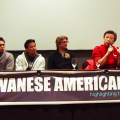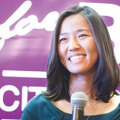 Meet Michelle Young. She is a graduate student in urban planning at Columbia University, holds a B.A. from Harvard in the History of Art & Architecture, and is a graduate of the Juilliard School of Music. She can usually be found in New York (where she grew up), Paris, backpacking in South America or Southeast Asia, or in-transit between. She has an obsession with buses, shoots with a Nikon SLR camera, and destroys cellos on stage with her indie rock band. She’s traveled to 35 countries, including working for earthquake disaster organizations in Peru and Sumatra.
Meet Michelle Young. She is a graduate student in urban planning at Columbia University, holds a B.A. from Harvard in the History of Art & Architecture, and is a graduate of the Juilliard School of Music. She can usually be found in New York (where she grew up), Paris, backpacking in South America or Southeast Asia, or in-transit between. She has an obsession with buses, shoots with a Nikon SLR camera, and destroys cellos on stage with her indie rock band. She’s traveled to 35 countries, including working for earthquake disaster organizations in Peru and Sumatra.
 L: Tell us a little bit about yourself, and something interesting that most people don’t know about you.
L: Tell us a little bit about yourself, and something interesting that most people don’t know about you.M: Well, I’m a Taiwanese-American born in Long Island, New York. I think some Taiwanese Americans would know me as one of the girls at the protest for Wen-Jia Bao at Harvard, where fellow classmate Sophia Lai and I dressed in the Taiwanese independence flag. Little did I know the Associated Press would be there, and the next morning our pictures were on the front cover of the Chinese World Journal, double the size of the photograph of the premier. But I spent the next four years after college working in the corporate offices of Abercrombie & Fitch, J.Crew and Calvin Klein as a merchandiser/buyer. I joined an indie rock band that ended up touring all over the U.S., and showcased at SXSW several times. I quit my job, went backpacking all around the world, worked in earthquake relief in Peru and Sumatra constructing and deconstructing houses, and then decided to go to graduate school to study urban planning. I’m a bit all over the place, but I enjoy life off the beaten path. I don’t plan on ever working an office job again.
L: What is UntappedCities and what was your inspiration for the site?
M: Untapped is a website that explores cities from an architectural, photographic and historical perspective. It began one summer on a whim. I wanted to check out all these cool places I had heard about in New York City—the abandoned City Hall Subway station; a makeshift mini golf course built by artists in Bushwick, Brooklyn; Vinegar Hill, one of the last places in New York where it still looked like the 18th century. Places that people even from New York City didn’t know about. I also knew that I wanted to write about places from an academic perspective and translate these concepts to a broader audience… The response to the website has been incredible, with press in the New York Times, Gawker, Gothamist, Curbed and we’ve expanded to Paris, Detroit, New Orleans, with San Francisco, London, Singapore, Miami and Atlanta coming this year. Untapped is one of just 76 websites that the Wall Street Journal New York Edition Twitter follows. I’m so excited to see where this whole thing can go. I think it’s also amazing that social media and web entrepreneurship has enabled someone like me to a find a calling—I’m just glad I wasn’t born 100 years ago!
 L: How has your Taiwanese heritage has influenced who you are and what you’re doing today?
L: How has your Taiwanese heritage has influenced who you are and what you’re doing today?
M: I give a lot of credit to my parents. Maybe being Taiwanese made them a little more renegade. Even though I had to do the typical Asian things— learn piano, perform cello at Carnegie Hall, get straight A+’s in school, go to Harvard—they also let me paint, run track, play basketball, even drink alcohol! And most importantly, they took me traveling everywhere. Taiwan when I was four, Germany and Austria when I was nine, a full-country tour of Spain when I was ten, Greece and Turkey by the time I was thirteen. They sent me to sleep away camp when I was twelve—playing with the Disney Orchestra in L.A., balanced by CTY Johns Hopkins to learn etymology the same summer And then over the years, I was sent to Oxford (UK), Switzerland, Austria and camps all over the U.S. There isn’t one way to be “Asian” or “American,” and I think I was taught that it’s cool to break the stereotype. And maybe because Taiwan has always been defined, for better of worse, viz-a-vis other countries, I was told to explore and see as many cultures as you can. This isn’t to say that my parents weren’t extremely stressed when I started living out of a 10kg backpack traveling around Southeast Asia and South America, or when I decided to join an indie rock band… But as you can see, I don’t like being told that I’m not allowed to do something!
 L: I saw that you went to Juilliard; can you tell me about your experience there?
L: I saw that you went to Juilliard; can you tell me about your experience there?
M: I starting going to the Juilliard Pre-College division when I was eleven for cello. The focus was on our solo careers, but we were also in orchestra, chamber music, music theory and ear-training. Juilliard is what introduced me to New York City and catalyzed my fascination for urban places. But, I always knew I didn’t want to be a professional cellist—I’m a little too spastic for a career that requires practicing so many hours a day, repeating the same task over and over. Actually, playing in my indie-punk-rock band was the first time that all of my classical training made sense and I really emotionally connected with playing cello.
L: Do you have any words of advice for people going into photography?
M: I taught myself how to use an SLR camera. There’s this misconception that SLR cameras are expensive, but you can get an entry-level one for the same price as a good point-and-shoot. And later you can invest in fun lenses. SLRs all come with auto settings, and quasi auto settings to wean you slowly to full manual. If you enjoy taking pictures, definitely consider moving to an SLR. For me, photography is predominantly about framing an image—I think it’s because I understand architecture best. This can be a static scene, like landscape, or a candid moment. I use photography to understand a space, so even if I’m researching for a paper or presentation, I go and photograph the space first. I take my SLR camera to parties and while hiking a mountain in Bolivia—those cameras are sturdy and versatile.
L: Thanks Michelle for introducing us all the amazing things you’ve been working on! For our TaiwaneseAmerican.org readers, learn more about Untapped Cities at untappedcities.com, and hear some of Michelle’s indie-rock band music at kittensablaze.com (releasing a new EP in May).






Leave a Reply